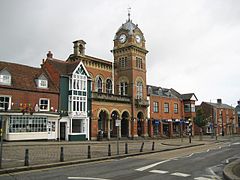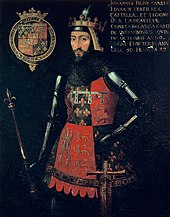Hungerford
This article needs additional citations for verification. (January 2011) |
- For other uses, see: Hungerford (disambiguation)
| Hungerford | |
|---|---|
 Hungerford Town Hall | |
| Population | 5,559 (2001) |
| OS grid reference | SU337685 |
| Civil parish |
|
| Unitary authority | |
| Ceremonial county | |
| Region | |
| Country | England |
| Sovereign state | United Kingdom |
| Post town | HUNGERFORD |
| Postcode district | RG17 |
| Dialling code | 01488 |
| Police | Thames Valley |
| Fire | Royal Berkshire |
| Ambulance | South Central |
| UK Parliament | |
Hungerford is a market town and civil parish in Berkshire, England, 9 miles (14.5 km) west of Newbury. It covers an area of 5,372 acres (22 km2) and, according to the 2001 census, has a population of 5,559 (2006 estimated at 6,789).
Geography


Hungerford is on the River Dun in the Kennet Valley at grid reference SU337685. It is the westernmost town in Berkshire, situated on the border with Wiltshire, and lies within the North Wessex Downs Area of Outstanding Natural Beauty. The highest point in the entire South East England region is the 297 m (974 ft) summit of Walbury Hill, situated only 4 miles (7 km) from the town. The Kennet and Avon Canal separates Hungerford from what might be described as the town's only suburb, the small hamlet of Eddington.
The town marks the border of the South East England and South West England regions (it is situated only 3 km within South East England), being some 68 miles (109 km) west of central London and 55 miles (88 km) east of Bristol on the A4 national trunk route. It is almost equidistant from the towns of Newbury and Marlborough, and lies 2.5 miles (4 km) south of junction 14 of the M4 motorway.
The parish was formerly divided into four tithings : Hungerford or Town, Sanden Fee, Eddington with Hidden and Newtown and Charnham Street. North and South Standen and Charnham Street were always officially detached parts of Wiltshire until transferred to Berkshire in 1895. Leverton and Calcot were transferred to Hungerford parish from Chilton Foliat in Wiltshire in 1895. All the land south of the Kennet was formerly included in Savernake Forest.
Nearby places
Towns: Marlborough, Newbury, Swindon, Reading, Lambourn.
Villages: Chilton Foliat, Great Shefford, Kintbury, Little Bedwyn, Froxfield, Ramsbury, Shalbourne, Stockcross, Ham, Inkpen, Aldbourne, Burbage, Hungerford Newtown.
Places of interest: Crofton Pumping Station, Wilton Windmill, Littlecote House, Freeman's Marsh, Walbury Hill.
Communications

Hungerford is situated on several transport routes, of both historic and current importance, including the M4 motorway (junction 14), the Old Bath Road (A4), and the Kennet and Avon Canal (opened 1811). It also has a railway station on the Reading to Taunton line; a reasonable rail service to Newbury, Reading and London means that the Hungerford has developed into something of a dormitory town which has been slowly expanding since the 1980s. Many residents commute to nearby towns such as Newbury, Swindon, Marlborough, Thatcham and Reading.
Government
Hungerford is a civil parish, covering the town of Hungerford and a surrounding rural area, including the small village of Hungerford Newtown. The parish shares boundaries with the Berkshire parishes of Lambourn, East Garston, Great Shefford, Kintbury and Inkpen, and with the Wiltshire parishes of Shalbourne, Froxfield, Ramsbury and Chilton Foliat.[1]
Parish council responsibilities are undertaken by Hungerford Town Council, which consists of fifteen volunteer councillors and committee members, supported by a full time clerk. The mayor is elected from amongst their numbers. The parish forms part of the district administered by the unitary authority of West Berkshire, and local government responsibilities are shared between the town council and unitary authority.
Hungerford is part of the Newbury parliamentary constituency. Its MP is the Conservative Richard Benyon, son of Sir William Benyon of Englefield House. He has represented the two towns since 2005.
Hungerford participates in town twinning to foster good international relations:
Hungerford Archers

Hungerford Archers is a longbow archery club based in Hungerford. Its shooting ground is the sports field of the John O'Gaunt Community Technology College.
History and notability
Formerly called Hungerford Longbow Club, it was founded by the late Bob Maslin in 1995, and was renamed in 2005. The club originally used the Hungerford Town F.C. Field as its shooting ground, later moving to the larger field at the John O'Gaunt school.
Hungerford Archers is a longbow only club and does not permit the general use of compound bows or crossbows. The reason for this restriction is that more powerful compound can permanently damage targets, whereas longbows are unlikely to do so. Members are allowed to use recurve style bows if they wish.
Activities
Members meet on Sunday mornings and occasionally on Wednesday evenings in the summer, weather permitting. Practise consists of shooting at standard straw archery targets. These are typically placed at 30 yards for juniors and novice shooters, with additional targets placed at 50, 60 or 80 yards for members who are more experienced and have more powerful bows.
As the majority of members do archery as a pastime rather than regular competition, the meetings and shooting are of a relaxed nature with little competition between members. There is no "ranking" within the club that compares one members skill to another.
The members also undertake a form of archery known as Clout archery, where the target is a circle on the ground at long range (about 180 yards) that the shooters must drop the arrows into using a high trajectory.
At least once a year the club holds a "fun shoot" where all members may come for an extended meeting that encompasses a barbecue and a specially laid out challenge course of shooting. This may include life sized models of game, wand targets, unusual targets such as hanging footballs and targets that require the use of "floo floo" arrows, which are specifically designed not to fly straight.
Hungerford archers are also present at many local events, especially school fetes, allowing young people to experience the sport of archery and sample shooting at close range. Some of the clubs more experienced members also act as representatives by competing in competitions and events, such as the annual Western Meeting at Bowood House.
Hocktide

Hungerford is the only place in the country to have continuously celebrated Hocktide or Tutti Day (the second Tuesday after Easter). Today it marks the end of the town council's financial and administrative year, but in the past it was a more general celebration associated with the town's great patron, John of Gaunt (see below). Its origins are thought lie in celebrations following King Alfred's expulsion of the Danes.
The 'Bellman' (or Town Crier) summons the Commoners of the town to the Hocktide Court held at the town hall, while two florally decorated 'Tutti Men' and the 'Orange Man' visit every house with commoners' rights (almost a hundred properties), accompanied by around six Tutti Girls, drawn from the local school. Originally they collected 'head pennies' to ensure fishing and grazing rights. Today, they largely collect kisses from each lady of the house. In the court, the town's officers are elected for the coming year and the accounts examined. The court manages the town hall, the John of Gaunt Inn, the Common, Freemen's Marsh, and fishing rites in the Rivers Kennet and Dun.
Legends
There is an old legend that "Hingwar the Dane" (i.e. Ivarr the Boneless) was drowned accidentally while crossing the Kennet here, and that the town was named after him. This stems from the probably mistaken belief that the Battle of Ethandun took place at Eddington in Berkshire rather than Edington in Wiltshire or Edington in Somerset.
Literature
Hungerford may be Kennetbridge in Thomas Hardy's novel Jude the Obscure, but this is usually thought to be Newbury. Kennetbridge is "a thriving town not more than a dozen miles south of Marygreen"[2] (Fawley) and is between Melchester (Salisbury) and Christminster (Oxford).[3] The main road (A338) from Oxford to Salisbury runs past Fawley and through Hungerford, which is south of Fawley rather than south-east like Newbury.
History

Hungerford is a Saxon name meaning 'Hanging Wood Ford'. The town’s symbol is the six-pointed star and crescent moon.
The place does not occur in the Domesday Book of 1086, but certainly existed by 1173. By 1241, it called itself a borough. In the late 14th century, John of Gaunt was medieval lord of the manor and he granted the people the lucrative fishing rights on the River Kennet.
The noble family of Walter Hungerford, 1st Baron Hungerford originated from the town (c. 1450–1450), although after three generations the title passed to Mary, Baroness Hungerford who married Sir Edward (afterwards Lord) Hasting and the family seat moved to Heytesbury in Wiltshire.
During the English Civil War, the Earl of Essex and his army spent the night here in June 1644. In October of the same year, the Earl of Manchester’s cavalry were also quartered in the town. Then, in the November, the King’s forces arrived in Hungerford on their way to Abingdon.
During the Glorious Revolution of 1688, William of Orange was offered the Crown of England while staying at the Bear Inn in Hungerford.
St. Lawrence's parish church stands next to the Kennet and Avon Canal. It was rebuilt in 1814-1816 by John Pinch the elder in Gothic style and refurbished again in the 1850s.
In the late 19th century, two policeman were shot by poachers in Eddington. Their memorial crosses still stand where they fell.
1987 massacre
The Hungerford massacre occurred on August 19, 1987. A 27-year-old unemployed local labourer, Michael Robert Ryan, armed with several weapons including an AK-47 rifle and a Beretta pistol, shot and killed 16 people including his mother, and wounded 15 others, then fatally shot himself. A report on this incident was commissioned by Home Secretary Douglas Hurd from the Chief Constable of Thames Valley Police, Colin Smith. It remains, along with the Dunblane massacre and Cumbria shootings, one of the worst criminal atrocities involving firearms in British history. The massacre led to the Firearms (Amendment) Act 1988[1], which banned the ownership of semi-automatic centre-fire rifles and restricted the use of shotguns with a magazine capacity of more than two rounds. The Hungerford Report had demonstrated that Ryan's collection of weapons was legally licensed.
Notable people

- Ivarr the Boneless, Danish Viking invader.
- John of Gaunt, 1st Duke of Lancaster, son of King Edward III
- Sir Robert de Hungerford, a Baron Hungerford and a 14th century statesman
- Charlie Austin, Footballer for Burnley
- Samuel Chandler, Nonconformist divine
- Christopher Derrick, author
- Rodney Desmeules, footballer for Swindon Town FC, Town Councillor
- William Greatrakes, connected with the authorship of the Letters of Junius
- Thomas Hayward (literary editor) (d. 1779?), editor of The British Muse (1738) and lawyer in Hungerford
- Charles Portal, 1st Viscount Portal of Hungerford, RAF Chief of the Air Staff during most of World War II
- Robert Snooks, last highwayman to be hanged in England, born in Hungerford 1761
- James E. Talmage, (1862 – 1933) Mormon church leader, writer and theologian. Author of Jesus the Christ
- Will Young, singer
See also
- Hungerford Town F.C.
- List of places in Berkshire
- List of civil parishes in England
- List of towns in England
- Hungerford Archers
References
- ^ "Election Maps". Ordnance Survey. Retrieved 2008-02-27.
- ^ Paragraph 4, Chapter VII, Part Fifth, Thomas Hardy, Jude the Obscure at http://www.gutenberg.org/files/153/153-h/153-h.htm#5-7
- ^ Paragraph 6, Chapter X, Part Third, Thomas Hardy, Jude the Obscure at http://www.gutenberg.org/files/153/153-h/153-h.htm#5-7
